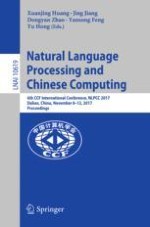2018 | OriginalPaper | Buchkapitel
Vietnamese Part of Speech Tagging Based on Multi-category Words Disambiguation Model
verfasst von : Zhao Chen, Liu Yanchao, Guo Jianyi, Chen Wei, Yan Xin, Yu Zhengtao, Chen Xiuqin
Erschienen in: Natural Language Processing and Chinese Computing
Aktivieren Sie unsere intelligente Suche, um passende Fachinhalte oder Patente zu finden.
Wählen Sie Textabschnitte aus um mit Künstlicher Intelligenz passenden Patente zu finden. powered by
Markieren Sie Textabschnitte, um KI-gestützt weitere passende Inhalte zu finden. powered by
